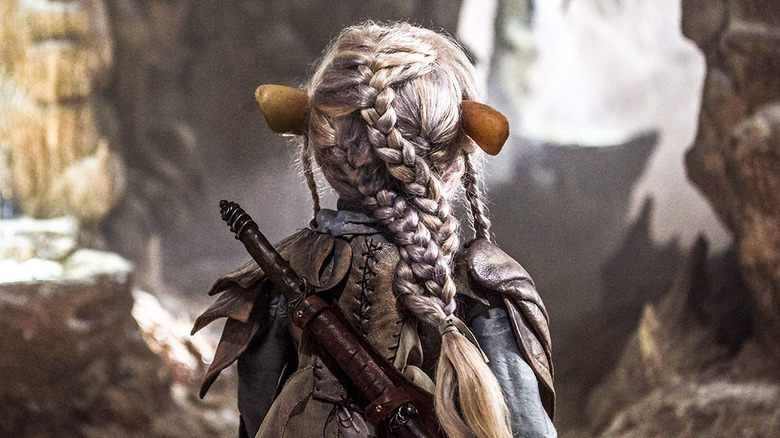
(Welcome to TV, Interrupted, a series where the /Film team remembers, eulogizes, and makes a case for the revival of TV shows we loved that were canceled far too soon.)
You can see why audiences didn't really know what to do with "The Dark Crystal" when it opened in theaters back in 1982. Directors Jim Henson and Frank Oz's fantasy adventure was a far cry from their earlier work on "The Muppet Show" and the first two "Muppet" films, substituting the playful mayhem of Kermit and the gang for a story about the grim, decaying world of Thra and its grotesque overlords, the Skeksis.
Critics were also mixed on "The Dark Crystal," and not without reason. There's plenty to admire about the movie, from the eldritch designs of Thra's architecture (based on Brian Froud's spectacular concept art) to the majestic exteriors filmed in places like the Scottish Highlands and Gordale Scar, as well as the groundbreaking puppetry and animatronics used to bring all manner of imaginative and often frightening creatures to life. At the same time, it has a pretty bare-bones hero's journey plot in which the hero, the Gelfling Jen, is sadly less interesting than just about everything else in the film.
Of course, none of that mattered to me watching "The Dark Crystal" growing up. It wasn't until I was older that I began to focus less on the movie's inventive visuals and more on the cracks in its story and characters. If anything, though, that just left me all the more excited when, starting in the 2000s, news of a "Dark Crystal" film sequel being in the works popped up every few years ... and all the more frustrated when, ultimately, nothing would come of it.
Still, I kept waiting for some kind of on-screen continuation that would realize the full potential of the "Dark Crystal" universe. Finally, in May 2017, Netflix and The Jim Henson Company announced they were teaming up for "The Dark Crystal: Age of Resistance," a prequel series set long, long before the events of Henson and Oz's now-cult classic fantasy movie. Upon its arrival two years and a few months later, the show not only managed to meet my high expectations -- it also proved to be surprisingly and even daringly political.
Why The Dark Crystal: Age Of Resistance Was Great
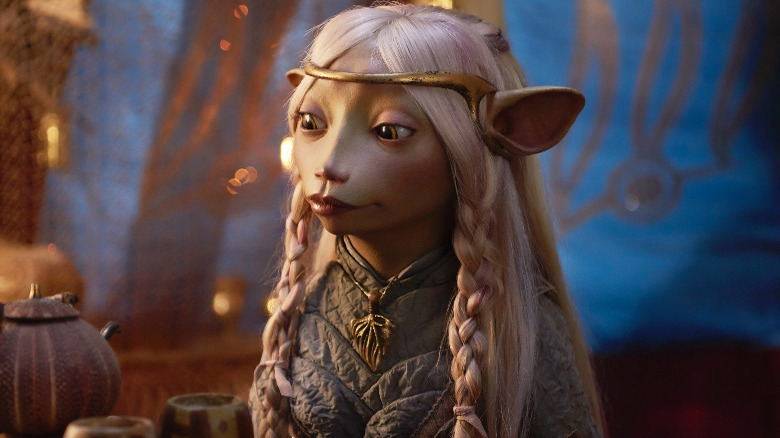
One of the best choices "The Dark Crystal: Age of Resistance" developers Jeffrey Addiss and Will Matthews made was to center the show on three leads: The Gelflings Rian (voiced by Taron Egerton), Brea (Anya Taylor-Joy), and Deet (Nathalie Emmanuel). They might be simple fantasy archetypes — the kindly warrior, the rebellious princess, and the nature-loving outsider — but they're also endearing and lovable heroes in their own right (Deet especially). What's more, their individual journeys stray from the typical monomyth. Rather than being reluctant do-gooders called upon to fulfill their destinies, the trio actively chooses to protect their world at a great personal risk by uncovering or exposing the truth about the Skeksis (who, at this point in the "Dark Crystal" timeline, are still pretending to be benevolent rulers).
Having three protagonists and more than two hours to devote to world-building allows "Age of Resistance" to really explore Thra and flesh out its inhabitants. Delightful side characters like Hup (Victor Yerrid), a plucky Podling who wants to defy tradition and become a paladin, are given unique motivations and personalities, and even some of the Skeksis have quirks and insecurities that set them apart from one another. (Others, I admit, are mostly defined by their gross habits.) The show's killer voice cast also goes a long way in making the puppets feel alive, as do the tweaks to the Gelflings' eyes and facial movements that allow them to be more expressive than they were in "The Dark Crystal."
The many advances in technology since 1982 serve "Age of Resistance" equally well. While Henson and Oz did find ways of making it seem like the puppets in "The Dark Crystal" could move of their own accord (like having an actor dress up as Jen and filming them from a distance), they were often limited to static shots that only showed the Gelflings and other non-Skeksis from the waist up. With green screen and CGI at their disposal, however, "Age of Resistance" director Louis Leterrier (2010's "Clash of the Titans") and his puppeteers could make the residents of Thra leap, run, fight, or fly with far greater fluidity. This, in turn, freed up director of photography Erik Wilson ("Paddington 2") to capture both the scenery (a pre-apocalyptic Thra bursting with splendid colors and life) and action through a wider range of compositions, including lots of handheld camera-work to make the whole thing feel less staged.
This brings me to my earlier point about the show being political. "Age of Resistance" is all about just how hard it is to start a much-needed revolution, even when the beings who rule the world (like the Skeksis) clearly have malicious intentions and are barely doing anything to hide them anymore. It also uses its fantasy setting to address such prickly topics as racism, tribalism, and social inequality in a way that's considerate and acknowledges that sometimes people (er, Gelflings) will fight to maintain the status quo despite knowing that others are being actively harmed by it — if they decide it's in their own personal interest. Hits a little close to home, right?
Why The Dark Crystal: Age Of Resistance Was Canceled
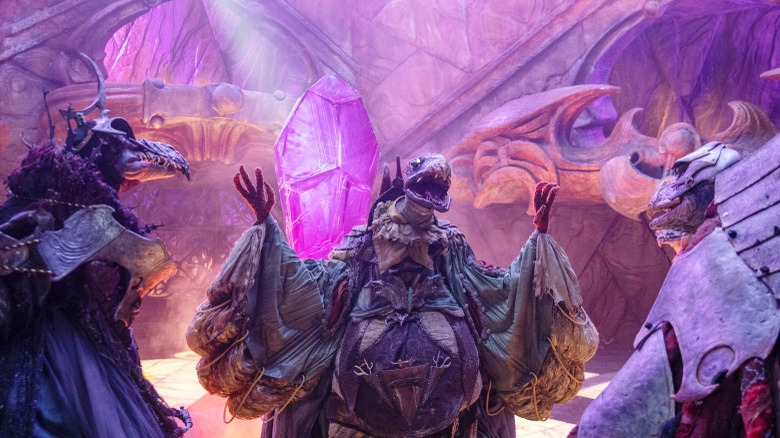
It's no mystery why "The Dark Crystal" and Henson's other cult '80s fantasy movie, "Labyrinth," were far from popular upon their initial release: They're films that combine weirdly adult elements (in the case of "The Dark Crystal," genuinely upsetting violence) with silly-yet-scary puppets, which limit their appeal to both younger and older audiences, broadly-speaking. What I'm saying is, you have to vibe with their more bizarre qualities to enjoy them — which I do and I know many others do as well. But if you don't, then they just won't have much to offer you (and that's understandable).
"The Dark Crystal: Age of Resistance" was in the same boat, only with the added complication that it was part of an older franchise that a lot of people just didn't have any nostalgia for. So, even though it's a prequel show that doesn't require anyone to know a thing about "The Dark Crystal" going in, that made for yet another barrier the series had to overcome. It was a show that would've almost certainly benefited from a weekly release model, allowing it to gradually build word of mouth. Instead, Netflix dropped the entirety of its first season at once (as it does it all of its series) and the majority of people who watched it were probably already members of the "Dark Crystal" fanbase.
Netflix never released any official viewership statistics for "Age of Resistance," but in this case, it didn't need to. This was clearly a labor-intensive, big-budget show to make, and the odds were always stacked against it, well before the series' lack of social media buzz made it obvious that it wasn't doing great numbers. Netflix didn't even get around to confirming the show had been canceled until more than a year after season 1 premiered, by which point the announcement came across as little more than a courtesy. Insiders referred to "Age of Resistance" as a "pricey miss" and an "expensive disappointment" at the time, in case there was any doubt as to why it had gotten the axe.
Unfinished Business
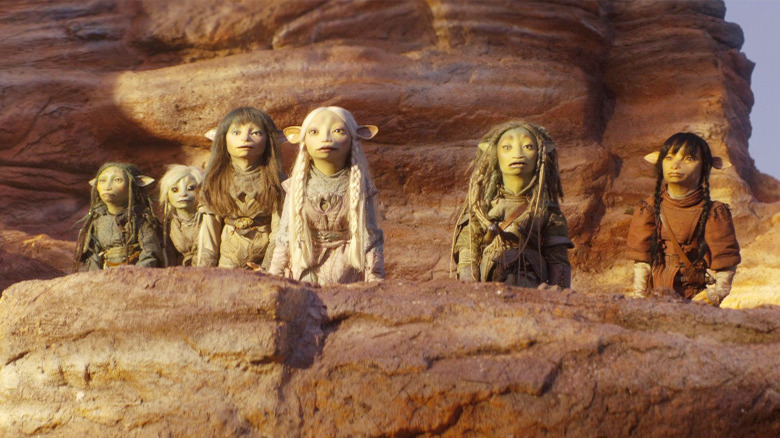
Another factor working against "The Dark Crystal: Age of Resistance?" From the get-go, anyone who had even a passing familiarity with "The Dark Crystal" knew that things simply could not work out well for the show's heroes.
In case you had forgotten, Henson and Oz's movie reveals the Skeksis committed genocide against the Gelflings after it was prophesied that one of their kind would heal the Crystal of Truth, defeat the Skeksis, and rejuvenate Thra. That means "Age of Resistance" would have had to end on a very depressing note, with most (if not all) of the show's heroes having sacrificed their lives to protect the planet in the hopes that, one day, the prophecy would be fulfilled. Basically, the show could've become the "Rogue One: A Star Wars Story" of "Dark Crystal" adventures, which would have been all the more appropriate since both they subvert the fantasy trope of a "chosen one" saving the day in similar ways.
Even with that in mind, the "Age of Resistance" season 1 finale left some major plot threads dangling for season 2 to pick up. Firstly, there was Deet, who isolated herself from the other Gelflings, fearing she could harm them with her newfound ability to control the Skeksis' own evil power (a.k.a. "The Darkening") and use it against them. Then there was Brea, who had recovered the Crystal of Truth's missing shard and surely would have sought to restore it, had the series continued. The season 1 finale even concluded with a full-blown teaser for season 2 by showing that SkekTek (a.k.a. the Skeksis' Scientist, voiced by Mark Hamill) had created the deadly, giant crab-like foot-soldiers known as the Garthim.
On top of all that, "Age of Resistance" didn't get a chance to explain the aforementioned prophecy. Was there more to its origins than "The Dark Crystal" had let on? Could it have turned out the leads in "Age of Resistance" were directly linked to it? Heck, for that matter, "Age of Resistance" might have gone on to reveal there were more Gelflings that avoided being slaughtered by the Skeksis and were waiting for someone like Jen to emerge, similar to how the prequel-era "Star Wars" animated series have shown that more Jedi survived Order 66 than initially believed. (Sorry to keep going back to "Star Wars." There are just a lot of parallels between it and the "Dark Crystal" franchise.)
Will The Dark Crystal: Age Of Resistance Ever Return?
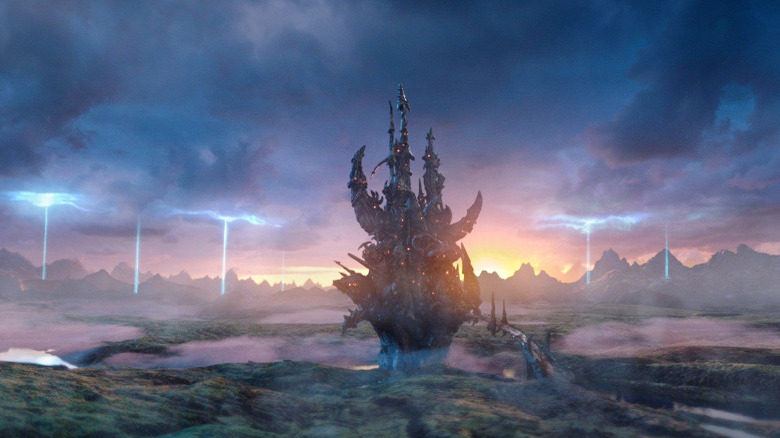
Jim Henson always seemed to hold "The Dark Crystal" close to his heart even after it failed to become the success he hoped it would be, and you can see why. Beneath its strange fantasy surface and basic plot, it embodies the same humanist tenets as "Sesame Street," "Fraggle Rock," and everything else he ever worked on. (Yes, for all their irreverence, even the Muppets hold true to those same principles.)
This also accounts for why The Jim Henson Company, under the watch of Henson's children, has remained fiercely protective of the property over the decades and has fought time and time again to keep it going, well after it became obvious "The Dark Crystal" would never be a crossover hit. Even when the proposed film sequel fell apart, the company allowed Archaia Comics and BOOM! Studios to turn its script, "The Power of the Dark Crystal," into a 2017 limited comic book series — one that, like "The Dark Crystal: Age of Resistance," was praised for its blend of gnarly, punk fantasy and humanism.
"Age of Resistance" was actually coming off winning the Primetime Emmy for outstanding children's program at 2020's Primetime Creative Arts Emmy Awards when it was canceled, which just goes to show I'm not the only one who thought it was pretty great and, as such, deserved to live on in some way. The Jim Henson Company's CEO, Lisa Henson, offered a grain of hope that it could do just that back when she confirmed the series wouldn't be getting another season, stating: "We know fans are eager to learn how this chapter of The Dark Crystal saga concludes and we'll look for ways to tell that story in the future."
More recently, The Jim Henson Company President of TV, Halle Stanford, said she still hasn't given up on finding a way back into the "Dark Crystal" universe, stating: "We are nimble, we are resilient. We are ready to jump. The minute anyone would like to jump back into Thra, it is a world that we will continue to build on and think about." Indeed, if there's any one lesson to take away from "Age of Resistance," it's that you have to keep showing up to bring about the changes you want to see in the world, even when it seems all-but-impossible.
Read this next: Single-Season '80s Sci-Fi And Fantasy Shows That Deserve A Second Shot
The post TV, Interrupted: The Dark Crystal: Age of Resistance Went Out Fighting appeared first on /Film.
0 Comments